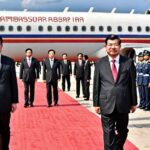The Impact of Mali, Niger, and Burkina Faso’s Departure from Ecowas on West African Trade
The departure of Niger, Mali, and Burkina Faso from the Economic Community of West African States (Ecowas) is anticipated to have a significant impact on the economic landscape of West Africa. Originally established with 15 member states, Ecowas is now down to 12, which could potentially affect regional trade in the area.
Founded in 1975, Ecowas has been a pivotal force in fostering regional integration in West Africa. Its primary objective is to establish a unified and expansive trading bloc through enhanced economic cooperation. However, progress towards regional integration has been slow, with intra-regional trade remaining significantly lower compared to other regions and West African economies heavily reliant on informal activities.
The influence of political elites is a major factor contributing to the slow progress in regional integration. These elites have established informal networks that promote trade between West African countries, impeding the implementation of official trade facilitation initiatives and making the region one of the most expensive in the world to conduct business.
The departure of Mali, Niger, and Burkina Faso from Ecowas is not only a political decision but also carries significant economic consequences. Previous border closures between Sahelian and coastal countries have had detrimental effects on the regional economy, impacting the livelihoods of millions of individuals who heavily depend on regional trade.
The Sahel, a vast semi-arid region in West Africa, consists of some of the poorest and least developed countries. Consequentially, countries in the Sahel heavily depend on regional trade, particularly with coastal countries in the Gulf of Guinea, and free movement between West African countries is crucial for their economies.
The departure of Mali, Niger, and Burkina Faso from Ecowas is expected to significantly impact the regional economy, particularly affecting Sahelian countries due to their landlocked situation. The reintroduction of tariff barriers will make imports far more expensive for these countries, and informal trade is likely to surge, especially along the borders of Niger and Nigeria.
In addition to the economic repercussions, the decision to leave Ecowas is primarily motivated by political reasons. The bloc’s involvement in peacekeeping and security operations, along with its protocol on democracy and good governance, has led to the departure of these countries.
It is important to note that the departure of the three countries from Ecowas will not only affect their respective economies but also the entire West African regional trade landscape. The economies of Sahel and coastal countries heavily rely on the exchange of goods and services, and the departure of these countries will undoubtedly disrupt this interdependent relationship.
In conclusion, the departure of Mali, Niger, and Burkina Faso from Ecowas is expected to have far-reaching consequences on West African trade as a whole. The decision, primarily driven by political motivations, is set to directly impact the economies of the departing countries and the entire West African region.







Post Comment